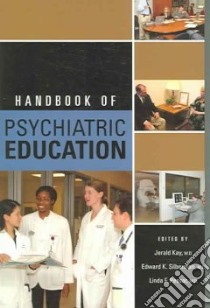Handbook of Psychiatric Education - 9781585621897
Un libro in lingua di Kay Jerald (EDT) Silberman Edward K. Pessar Linda F. M.D. edito da Amer Psychiatric Pub Inc, 2005
- € 67.20
- Il prezzo è variabile in funzione del cambio della valuta d’origine
Broad-based and comprehensive, the Handbook of Psychiatric Education covers all aspects of academic psychiatry responsibilities in teaching and education of students and residents. A concise, single-volume resource for faculty development in education, it incorporates recent innovations in teaching medical students and residents and details the newest technological tools for instruction. Its 14 chapters by 22 distinguished contributors address curriculum development and ongoing evaluation, specific teaching methods, organization and accreditation of educational programs, challenges and problems in teaching and administering graduate and undergraduate programs, role and functions of a teacher, and teaching residents how to teach.
The Handbook of Psychiatric Education, which shares many topics with the editors' 1999 Handbook of Psychiatric Education and Faculty Development addresses current trends, such as assessment methods for residency programs, the lack of researchers in psychiatry, the increase in applicants to resident psychiatry programs, and more stringent requirements for accountability in medical student education, in chapters on
- ? Residency special events, including a newand unfortunately necessarysection on dealing with disasters and terrorism? Teaching residents how to become effective teachers, including information relevant to the medical student curriculum and the residency? New undergraduate medical education teaching methods, including advice on determining which reform methods (such as problem- and case-based learning) are best suited to which types of educational goals, subject matter, and students? The selection of undergraduate preclinical curriculum, including guidance on how to divide course offerings between nontechnical aspects of medical practice, such as the doctor-patient relationship and interviewing, and competing technical aspects, such as neuroscience, human development, and psychological theories? New technologies in education, including discussion of the advantages and disadvantages of computer-based textbooks and clinical materials versus traditional materials and of live versus electronic teachers and addressing questions about Internet resources and required computer skills? A wide-ranging and provocative look at the future of psychiatric education
Sure to become required reading for all psychiatry faculty, the Handbook of Psychiatric Education is also invaluable reading for psychiatry residents, medical faculty, and members of the Association for Academic Psychiatry, the American Association of Directors of Residency Training in Psychiatry, the Association of Directors of Medical Student Education in Psychiatry, review committees, and licensing bodies.
Informazioni bibliografiche
- Titolo del Libro in lingua: Handbook of Psychiatric Education
- Lingua: English
- Autori : Kay Jerald (EDT) Silberman Edward K. Pessar Linda F. M.D.
- Editore: Amer Psychiatric Pub Inc
- Collana: Amer Psychiatric Pub Inc (Paperback)
- Data di Pubblicazione: 30 Ottobre '05
- Genere: MEDICAL
- Argomenti : Psychiatry Study and teaching United States Handbooks, manuals, etc Psychiatry Study and teaching (Residency) United States Handbooks, manuals, etc Psychiatry education
- Pagine: 379
- Dimensioni mm: 228 x 152 x 25
- ISBN-10: 1585621897
- EAN-13: 9781585621897


